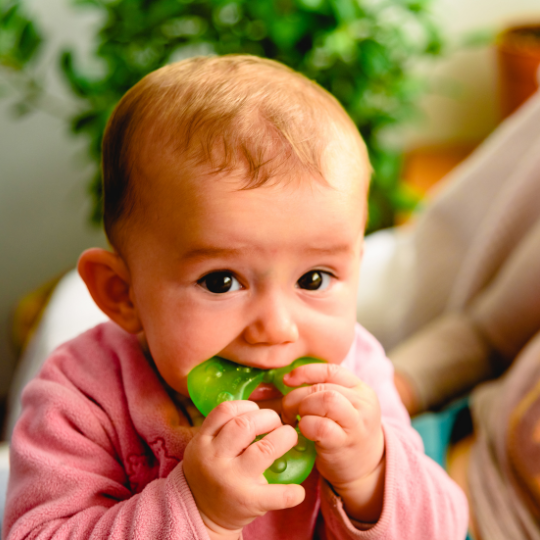Baby Teething 101: Spotting the Signs & Mastering Comfort Techniques

The journey of parenthood is a beautiful yet challenging one, especially when it comes to understanding and soothing your baby's teething discomfort. As parents, we strive to provide the utmost care and comfort to our little ones, especially during those trying times. Teething, a significant milestone in your baby's development, can be a source of discomfort for both the baby and the parents. In this article, we'll explore the essential signs, symptoms, and techniques to soothe your baby's teething woes, helping you navigate this phase with confidence and ease.
Understanding Baby Teething:
Teething typically begins around six months of age, although it can vary from one child to another. During this time, your baby's first set of teeth, also known as primary or baby teeth, starts to emerge through the gums. This process can be accompanied by various signs and symptoms, indicating that your baby is indeed teething.
Signs and Symptoms:
-
Excessive Drooling: One of the most common signs of teething is increased drooling. You may notice your irritable baby producing more saliva than usual, leading to damp clothing and skin irritation around the mouth.
-
Irritability and Restlessness: Teething discomfort can cause your baby to feel irritable and restless. They may become fussier than usual, have difficulty sleeping, and seek more comfort from you.
-
Swollen Gums: As the teeth begin to push through the gums, you may notice redness and swelling in the affected area. Your baby may also experience tenderness and discomfort when pressure is applied to the gums.
-
Chewing and Gnawing: Babies often instinctively chew and gnaw on objects to alleviate teething discomfort. You may observe your baby trying to bite down on toys, fingers, or even household items to soothe their gums.
-
Loss of Appetite: Some babies may experience changes in their eating habits during teething. They may refuse to breastfeed or bottle-feed due to the discomfort, while others may seek comfort through nursing or feeding more frequently.

Techniques to Soothe Teething Discomfort:
-
Chilled Teething Toys: Offering your baby chilled teething toys can provide relief by numbing the gums and reducing inflammation. Opt for BPA-free silicone or rubber toys specifically designed for teething babies and refrigerate them for added comfort.
-
Gentle Gum Massage: Using clean fingers, gently massage your baby's gums to alleviate teething discomfort. You can also use a clean washcloth or gauze pad to apply gentle pressure to the swollen areas.
-
Cold Compress: Applying a cold compress or a clean, wet washcloth to your baby's gums can help reduce inflammation and provide temporary relief from teething pain. Ensure that the compress is not too cold and always supervise your baby during its use.
-
Teething Rings: Silicone or rubber Liquid-Filled teething rings are designed to be chewed on and can effectively soothe your baby's sore gums. Choose teething rings that are easy for your baby to hold and manipulate, and avoid those filled with liquid or gel.
-
Breastfeeding or Bottle-Feeding: Nursing or feeding your baby can provide comfort and distraction during teething episodes. If your baby is having difficulty breastfeeding or bottle-feeding due to teething discomfort, try offering a chilled teething ring or breastmilk/formula popsicles to soothe their gums.
-
Over-the-counter remedies: Consult with your pediatrician before using over-the-counter teething remedies such as teething gels or medications. While some may provide temporary relief, others may contain ingredients that could be harmful to your baby.
-
Distraction and Comfort: Engage your baby in soothing activities such as singing, rocking, or cuddling to distract them from teething discomfort. Offering extra love and attention during this time can help reassure your baby and alleviate their distress.
FAQS:
When do babies start teething, and how long does it last? Babies typically start teething around six months of age, although it can vary. The process of teething can last for several months, with most children getting all their primary teeth by the age of three. However, every child is different, so some may start teething earlier or later, and the duration of teething can vary.
What are the best teething toys or products to soothe my baby's gums? The best teething toys are those made of safe, BPA-free materials that are specifically designed for babies to chew on. Silicone or rubber teething toys are popular choices as they are soft yet durable. Look for toys with different textures that can massage and soothe your baby's gums. Additionally, chilled teething rings or toys can provide added relief by numbing the gums and reducing inflammation.
Are there any natural remedies for teething discomfort? Some parents prefer to use natural remedies to soothe their baby's teething discomfort. Gentle gum massage with clean fingers or a wet washcloth can provide relief by applying gentle pressure to the swollen gums. Offering chilled, natural teething toys or a clean, cold washcloth to chew on can also help numb the gums and reduce inflammation. Additionally, breastfeeding or bottle-feeding can provide comfort and distraction during teething episodes.
Should I be concerned about my baby's drooling during teething? Excessive drooling is a common symptom of teething and is typically nothing to be concerned about. However, it's essential to keep your baby's skin dry to prevent irritation and rashes. You can use bibs or cloths to absorb excess drool and to gently wipe your baby's chin and mouth throughout the day. If drooling is accompanied by other symptoms such as fever or diarrhea, or if you notice signs of dehydration, consult with your pediatrician.
Can teething cause fever or other serious symptoms? While teething can cause mild symptoms such as irritability, drooling, and swollen gums, it typically does not cause fever or serious diseases. However, some babies may experience a slight increase in body temperature while teething, but it's usually low-grade and not a cause for concern. If your baby develops a fever higher than 100.4°F (38°C), diarrhea, or other concerning symptoms, consult with your pediatrician to rule out other possible causes.
Final thoughts
Navigating your baby's teething journey can be a challenging yet rewarding experience. By understanding the signs, symptoms, and techniques to soothe teething discomfort, you can provide the comfort and medical care your little one needs during this phase of their development. Remember to consult with your pediatrician if you have any concerns or if your baby's teething symptoms persist. With patience, love, and the right techniques, you can help ease your baby's teething woes and ensure a smoother transition for both you and your little one.

